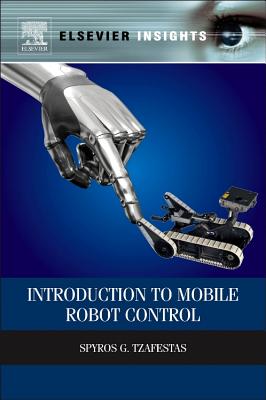Intelligent Control of Robotic Systems
暫譯: 機器人系統的智能控制
Behera, Laxmidhar, Kumar, Swagat, Patchaikani, Prem Kumar
- 出版商: CRC
- 出版日期: 2020-04-07
- 售價: $7,690
- 貴賓價: 9.5 折 $7,306
- 語言: 英文
- 頁數: 650
- 裝訂: Hardcover - also called cloth, retail trade, or trade
- ISBN: 1138597716
- ISBN-13: 9781138597716
-
相關分類:
機器人製作 Robots
海外代購書籍(需單獨結帳)
商品描述
商品描述(中文翻譯)
本書闡述了基本原則以及開發先進演算法以實現智慧型機器人系統。內容探討了機器人(如操作臂、移動機器人、四旋翼)如何從數據中學習自身的運動學和動力學的策略。在這個背景下,主要處理了兩個問題,即系統的穩定性和實驗驗證。本書中所涵蓋的學習演算法和技術也可以輕鬆擴展到其他機器人系統。書中包含基於 MATLAB 的範例和在機器人操作系統(ROS)下的 C 語言程式碼,以進行實驗驗證,讓讀者能夠在機器人平台上複製這些演算法。
作者簡介
Laxmidhar Behera received the B.Sc. and M.Sc. degrees in engineering from National Institute of Technology Rourkela, Rourkela, India, in 1988 and 1990, respectively, and the Ph.D. degree from the Indian Institute of Technology (IIT) Delhi, New Delhi, India. During 1995-1999, he was an Assistant Professor with Birla Institute of Technology and Science Pilani. During 2000-2001, he pursued the postdoctoral studies with the German National Research Center for Information Technology (GMD), Sank Augustin, Germany. During 2007-2009, he was a Reader with the Intelligent Systems Research Center, University of Ulster, Derry, U.K., on sabbatical from IIT Kanpur. He has also worked as a Visiting Researcher/Professor with FHG, Germany, and ETH, Zurich, Switzerland. He is currently a Professor with the Department of Electrical Engineering, IIT Kanpur. He has authored or coauthored over 200 papers published in refereed journals and presented in conference proceedings. He has been elected as Fellow of the Indian National Academy of Engineering (INAE) in 2017 for his distinguished contributions in the field of 'Engineering. His research interests include intelligent control, robotics, information retrieval, neural networks, cyber-physical systems, and cognitive modeling.
Swagat Kumar obtained his Bachelor's degree in Electrical Engineering from North Orissa University in 2001 and his Master's and his Ph.D. degree in Electrical Engineering from IIT Kanpur in 2004 and 2009 respectively. He was a postdoctoral researcher at Kyushu University in Japan during 2009-10. He, then, worked as an assistant professor at IIT Jodhpur for about two years before joining TCS Research in 2012. He currently heads the robotics research group at TATA Consultancy Services in New Delhi. His research interests include Robotics, Computer Vision and Machine Learning. He is a member of IEEE Robotics and Automation Society. He has co-authored about 40 articles in peer-reviewed conferences and journals and filed several patents.
Prem Kumar Patchaikani received the B.E. degree in electrical and electronics engineering from Thiagarajar College of Engineering, Madurai, India, in 2003, the M.Tech. degree in power and control from IIT Kanpur, Kanpur, India, in 2005, and the Ph.D. degree from the Department of Electrical Engineering, IIT Kanpur, in 2012. He was a Design Engineer with Larsen & Toubro Ltd., Chennai, India, from 2005 to 2006. He was a Visiting Researcher with the Intelligent System Research Center, University of Ulster, Londonderry, U.K., from 2008 to 2009, and in 2011. He is currently a Lead Engineer with General Electric, Bengaluru, India. His current research interests include visual servoing, redundant manipulator s, neural networks and fuzzy logic-based control, adaptive critic, system identification, and IC engine controls.
Ranjith Ravindranathan Nair received the Master's degree in guidance and navigational control from the College of Engineering, Thiruvananthapuram, Kerala, India. He received his Ph.D in control and automation from the Department of Electrical Engineering, Indian Institute of Technology (IIT) Kanpur, Kanpur, India. After completing his Ph.D, he was working as a post doctoral research fellow in Intelligent Systems and Control Lab at IIT Kanpur. Currently, he is working as an Assistant Professor in the Department of Electronics & Communication Engineering at Indian Institute of Information Technology Pune, India. His primary research interests include nonlinear control systems, multiagent systems, formation control, Intelligent control, cyber-physical systems and mobile robotics.
Samrat Dutta received the B.Tech. degree in electrical and electronics engineering from the Siliguri Institute of Technology, Siliguri, India, in 2005, and the M.Tech. degree in electrical engineering with a specialization in control system from the Department of Electrical Engineering, Jadavpur University, Kolkata, India, in 2010. He has received his Ph.D. degree in control and Automation from the Department of Electrical Engineering, IIT Kanpur, Kanpur, India in 2018. He was a Cluster Head with Sterling Communications Ltd., Chennai, India, from 2005 to 2007, where he was involved in Tata Teleservices mobile network infrastructure projects in India. He is currently working as a research scientist with TCS innovations Labs, Bangalore, India. His current research interests include Imitation learning, Reinforcement Learning, Intelligent Robots, Robotic Vision, Deep Learning, neural networks and fuzzy logic-based control, and system identification.
作者簡介(中文翻譯)
Laxmidhar Behera於1988年和1990年分別在印度Rourkela的國立技術學院(National Institute of Technology Rourkela)獲得工程學的學士和碩士學位,並在印度德里(New Delhi)的印度理工學院(Indian Institute of Technology, IIT)獲得博士學位。在1995年至1999年間,他擔任Birla Institute of Technology and Science Pilani的助理教授。在2000年至2001年間,他在德國Sank Augustin的德國國家資訊技術研究中心(German National Research Center for Information Technology, GMD)進行博士後研究。在2007年至2009年間,他在英國德里(Derry)的阿爾斯特大學(University of Ulster)智能系統研究中心擔任讀者,並從IIT Kanpur休假。他還曾擔任德國FHG和瑞士蘇黎世的ETH的訪問研究員/教授。目前,他是IIT Kanpur電機工程系的教授。他已發表或共同發表超過200篇在同行評審期刊上發表的論文,並在會議論文集中發表。他於2017年被選為印度國家工程院(Indian National Academy of Engineering, INAE)院士,以表彰他在「工程」領域的卓越貢獻。他的研究興趣包括智能控制、機器人技術、資訊檢索、神經網絡、網絡物理系統和認知建模。
Swagat Kumar於2001年在北奧里薩大學(North Orissa University)獲得電機工程學士學位,並於2004年和2009年在IIT Kanpur獲得電機工程碩士和博士學位。他在2009年至2010年間擔任日本九州大學的博士後研究員。隨後,他在IIT Jodhpur擔任助理教授約兩年,然後於2012年加入TCS Research。目前,他在新德里的TATA顧問服務(TATA Consultancy Services)負責機器人研究小組。他的研究興趣包括機器人技術、計算機視覺和機器學習。他是IEEE機器人與自動化學會的成員。他共同發表了約40篇在同行評審的會議和期刊上的文章,並申請了多項專利。
Prem Kumar Patchaikani於2003年在印度馬杜賴的Thiagarajar工程學院獲得電氣與電子工程學士學位,於2005年在IIT Kanpur獲得電力與控制碩士學位,並於2012年在IIT Kanpur電機工程系獲得博士學位。他於2005年至2006年在Larsen & Toubro Ltd.(印度金奈)擔任設計工程師。他於2008年至2009年及2011年擔任英國倫敦德里(Londonderry)阿爾斯特大學智能系統研究中心的訪問研究員。目前,他是印度班加羅爾的通用電氣(General Electric)首席工程師。他目前的研究興趣包括視覺伺服、冗餘機械手、神經網絡和基於模糊邏輯的控制、自適應批評、系統識別和內燃機控制。
Ranjith Ravindranathan Nair於印度喀拉拉邦的特里凡得琅(Thiruvananthapuram)工程學院獲得導航與控制碩士學位。他在印度IIT Kanpur電機工程系獲得控制與自動化博士學位。完成博士學位後,他在IIT Kanpur的智能系統與控制實驗室擔任博士後研究員。目前,他在印度信息技術學院(Indian Institute of Information Technology)普納(Pune)電子與通信工程系擔任助理教授。他的主要研究興趣包括非線性控制系統、多智能體系統、編隊控制、智能控制、網絡物理系統和移動機器人。
Samrat Dutta於2005年在印度西里古里的西里古里技術學院(Siliguri Institute of Technology)獲得電氣與電子工程學士學位,並於2010年在印度加爾各答的賈達夫普爾大學(Jadavpur University)電機工程系獲得控制系統專業的碩士學位。他於2018年在IIT Kanpur電機工程系獲得控制與自動化博士學位。他於2005年至2007年在印度金奈的Sterling Communications Ltd.擔任集群負責人,參與Tata Teleservices的移動網絡基礎設施項目。目前,他在印度班加羅爾的TCS創新實驗室擔任研究科學家。他目前的研究興趣包括模仿學習、強化學習、智能機器人、機器人視覺、深度學習、神經網絡和基於模糊邏輯的控制及系統識別。













